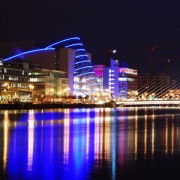The Evolution of Dublin’s Silicon Docks
What was once a symbol of industrial decline, Dublin’s docklands has become one of the most prosperous areas of the country, a symbol of how far Ireland has come in it’s recovery from the financial crisis of the 2000’s.
Over the past ten years the tech scene in Dublin has gone from strength to strength. Few can argue that Dublin is now a European Tech Hub with both well-established tech firms such as Google and Facebook based alongside new entrants such as Currency Fair, Viddyad and Storyful.
In addition to the large insurgence of multinational companies, Dublin has developed itself as a centre for innovation and startups. According to EU startups, Dublin is now ranked 7th in the top 15 European cities for their startup eco-system and provides the perfect springboard for reaching a European Market. At the centre of this innovation and tech boom is the Silicon Docks.
Silicon Docks, a term first coined by Jamie Smith of the Financial Times (2011), refers to the area around Grand Canal Dock, stretching to the IFSC in the north and Grand Canal in the south. The previously derelict area began to progress during the late 90’s and early 00’s after it was targeted for redevelopment with the aim of attracting multinational firms and tech firms to Dublin. A large part of the credit should be placed upon the IDA, the agency responsible for attracting and developing Foreign Direct Investment (FDI). The organisation helped to attract large tech companies by providing them with recruiting support, real estate support and other initiatives.
Dublin is attractive to MNCs due to a variety of reasons. Ireland has one of the youngest and best educated population in Europe. This offers MNC a large talent to hire from in Dublin. It is also complemented by the hiring of international talent by large MNCs. This unique combination has led to a young and diverse workforce who are some of the brightest and most talented people in Europe and the world.
Additionally, the Irish tax system favours businesses and offers a corporate tax rate which is one of the best in Europe. With a corporate tax rate of 12.5%, Ireland offers businesses an opportunity to create a competitive edge in the world market. This tax rate has encouraged many established and new companies to set up in Ireland and start entering the European market from a base in Dublin.
MNCs also gain a unique gateway into other major markets from Dublin. Dublin offers companies the opportunity to enter into European markets in an easier and more efficient way. Basing a company in Dublin allows companies to gain access to one of the best digital hubs in Europe. This three elements combined have made Dublin an attractive place to do business but also an attractive place to start a business and scale up fast.
With assistance and guidance from the IDA, Google set up their EMEA HQ in Dublin in 2002 and the establishment of the tech giant has been widely seen as a huge factor in other heavyweights following suit. Google has also contributed to the development of the Irish Start-Up scene by hosting Startup Weekends at their Campus and developing Start-up programs.
With the presence of large MNCs and the incentives which Dublin offers, the Silicon Docks has begun to flourish. Furthermore the development of suitable property for companies has enabled companies to set-up and scale up their workforce while based in the area.
The area not only plays host to the large tech giants such as Google and Facebook but also to a number indigenous start-ups. The Digital Hub, an organisation set up by the Irish government in 2003, provides flexible office space and business support services to growing technology companies. It is also involved in providing digital related learning and training opportunities geared to the local community.. According to the Irish Times, since the project’s inception, close to 200 companies have progressed through the Digital Hub, generating thousands of skilled jobs. Another organisation that played a key part in aiding in the development of the Technology Industry in Ireland is Enterprise Ireland. The organisation provides funding to local start-ups and support them in their growth. Examples include Food Cloud, a social platform for reducing food waste, Wattspot, who provide companies with charging points, and Park PnP, who enable users in renting out unused parking spaces.
The Dublin Tech Boom has created a favourable environment for entrepreneurs. There are hackathons held in some capacity each weekend and groups like Entrepreneurs Anonymous who provide support to entrepreneurs. The Dublin Tech Boom has created a infectious and inspiring mentality of “yes we can” in the capital that has long been absent in industry in Ireland.
Like any city that has developed an area around the technology industry, social elements of the liffey-side area have been galvanised. The Silicon Docks are not solely about work, they also offer plenty of facilities for outside the office brainstorming and fun. Take a quick stroll through the Silicon Docks and you’ll come across cafés, bars, and the Bord Gais Energy Theatre. A quick bike ride to the city centre allows you to get involved in the many different startup and Tech events taking place each day of the week in the city.
Those attending DTS will be right in the heart of silicon docks and have the opportunity to experience what it’s really like to live and work in Europe’s Technology Hub, as well as the opportunity to meet some of the start-ups shaping the future of tech. The StartUp100 programme at DTS, will feature 50% Irish startups and 50% International companies varying from a wide range of industries.








